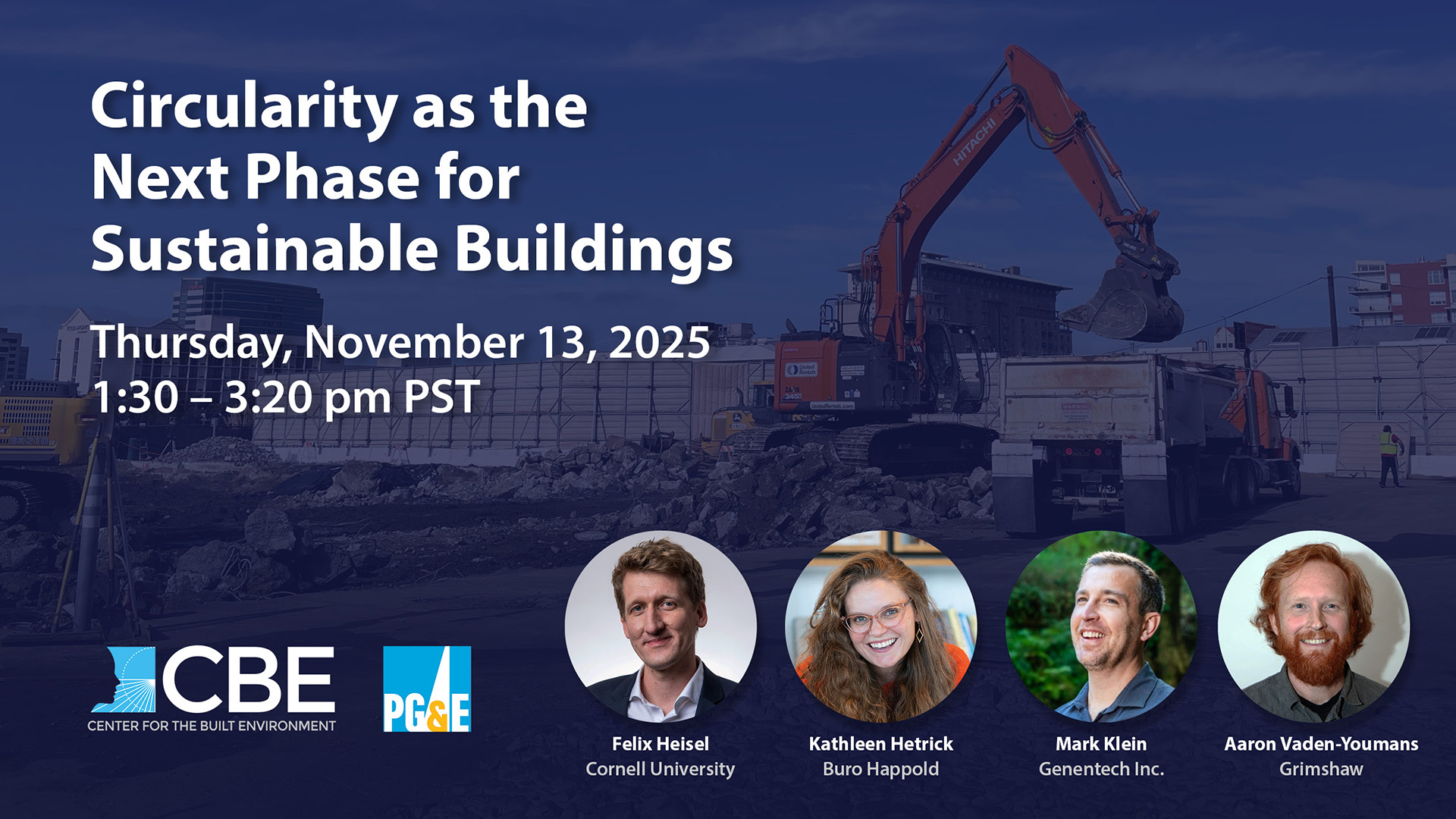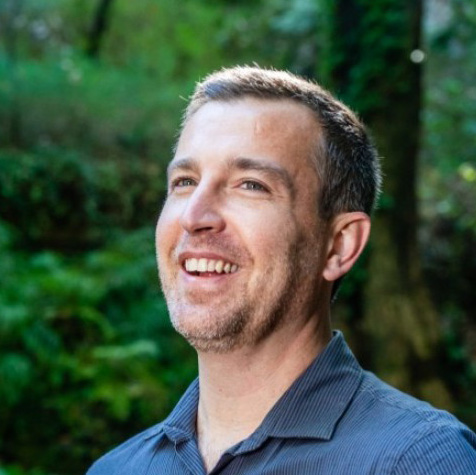
Circularity as the Next Phase for Sustainable Buildings
Circular economy principles represent the latest phase of sustainable building design, moving beyond efficiency to focus on full material lifecycles. By designing for reuse, repair and recycling, buildings shift from a linear “build–use–demolish” model to one that keeps resources in circulation and supports the health and welfare of building users and other stakeholder communities. Topics to be covered include mining built environments for material reuse and strategies and case studies on significant large-scale material reuse.
This online symposium will feature circularity experts with diverse areas of expertise, representing a cross-section of the building industry, from architecture, engineering, building portfolio management, and academia. Time will be reserved for Q&A and a panel discussion with all participants.
This event is free and open to the public, and co-sponsored by PG&E and UC Berkeley’s Center for the Built Environment.
Agenda Overview
1:30 PM: Announcements and agenda overview
1:40 PM: Speaker talks, each followed by short Q&A (actual sequence may vary)
- Felix Heisel will speak about the need for industry adoption of circular and the work of the Circular Construction Lab ranging from tools to demonstrators to legislation supporting this goal.
- Kathleen Hetrick will discuss the intersection of circular economy and public health at the building, community and policy level.
- Mark Klein will present how a global building portfolio manager is approaching sustainable deconstruction and materials reuse.
- Aaron Vaden-Youmans will explain how Grimshaw is bringing circular design into its broader mission of decarbonization and regenerative design, and featuring an adaptive reuse case study.
3:00 PM: Moderated panel discussion
3:20 PM: Conclude
Speakers and Presentations
-

Felix Heisel, International Assoc. AIA, Freier Architekt AKBW
Assistant Professor, Director of the Circular Construction Lab, Cornell University
Felix Heisel is Assistant Professor and Director of the Circular Construction Lab at Cornell University’s College of Architecture, Art, and Planning, as well as a Faculty Fellow at the Cornell Atkinson Center for Sustainability. He is a licensed architect in Germany and partner of 2hs Architekten und Ingenieur PartGmbB, an office dedicated to developing circular prototypologies. Heisel’s research and teaching focus on reimagining the built environment as a material depot for continuous reuse and transformation. His work on framing and scaling circularity has received international recognition, numerous awards, and is widely published, including Building Better – Less – Different: Circular Construction and Circular Economy (Birkhäuser, 2022) and Building from Waste (Birkhäuser, 2014). Heisel graduated from the Berlin University of the Arts and has held teaching and research positions at ETH Zürich, Harvard GSD, and other institutions worldwide.
-

Kathleen Hetrick, LEED AP BD+C, WELL AP, CSR-P
US Sustainability Integration Leader, Buro Happold
As the Buro Happold US Sustainable Integration Lead and a Bloomberg Fellow at Johns Hopkins University, Kathleen merges her passion for supply chain transformation and public health with her technical expertise in Architectural Engineering. She spearheads the sustainable design process on groundbreaking projects, including LEED Platinum campuses, Living Building Challenge civic institutions, and county-wide circular economy plans. Her recent work includes pioneering the circularity strategy for New York City’s first circular design pilot project, including the deconstruction and reuse of the construction materials for NYCEDC, Science Park and Research Campus (SPARC) Kips Bay, Component A. She is a board member of USGBC-California and a founding instigator of the Carbon Leadership Forum – Los Angeles. She currently chairs the USGBC-CA circularity committee. Her contributions to the construction industry earned her the 2023 Living Future Hero award.
-

Mark Klein, WELL Faculty, LEED AP BD+C & ND, Fitwel Ambassador
Senior Sustainability Manager, Healthy Workplaces, Genentech Inc.
Mark Klein is a sustainability leader at Genentech, driving campus-wide strategies that align with Roche’s global priorities in climate protection, circular economy, and biodiversity. He leads transformative initiatives such as Genentech’s Healthy and Sustainable Built Environment Program and the Campus Deconstruction Strategy, championing regenerative design, carbon-negative goals, and large-scale material reuse. With expertise in triple bottom line assessments, cross-functional stakeholder engagement, and alignment with LEED, WELL, and Living Building Challenge frameworks, Mark integrates data-driven analysis with creative solutions. His work advances sustainability across 200 acres and 50 buildings, embedding resilient systems that connect people, nature, and innovation for long-term impact.
-

Aaron Vaden-Youmans
Sustainability Lead (North America) Grimshaw
Aaron Vaden-Youmans is the North American Sustainability Lead at Grimshaw Architects, where he advances climate action and regenerative design grounded in science and equity. An architect and optimist, he believes we can build the world we want by forming tighter, more durable coalitions and finding new synergies to expand our bench of allies. Based in Los Angeles, he brings 20+ years of experience shaping bold, high-impact projects globally, including the Terra Pavilion at Expo 2020 Dubai, Miami’s Frost Museum of Science, and ASU’s Walton Center for Planetary Health. He also serves on the National Steering Committee of US Architects Declare Climate, Justice, and Biodiversity Emergency.
Continuing Education
At the conclusion of this course, participants will be able to:
- Describe how institutions can develop guidelines to inspire creative circularity problem solving.
- Explain methods for integrating sustainability into pre-construction and demolition phases of projects as well concept design
- Cite examples of reuse networks for projects and communities.
- Explain the difference between the traditional linear economic model and circular economy development.
This course qualifies for AIA continuing education, 2 LU/HSW credits.
